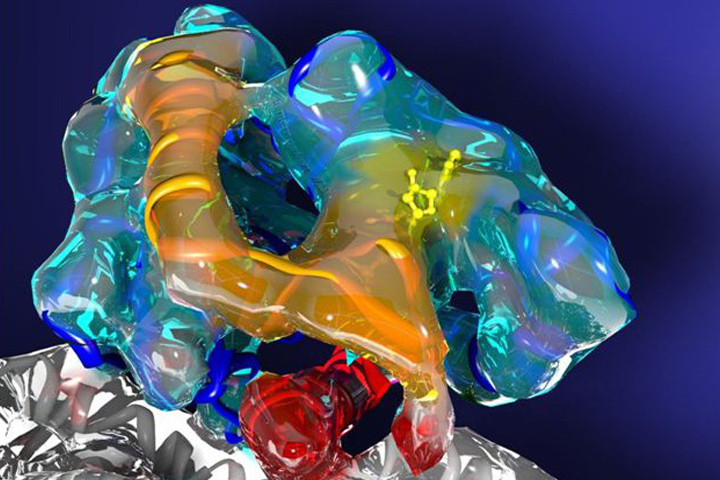A New Approach to Treating Some Advanced Pancreatic Cancer Patients

Charles Sindelar, Brandeis University
Can higher doses of a chemical that is found in the body make standard chemotherapy more effective against advanced pancreatic cancer?
For some patients the answer may be yes. Scientists are testing a synthetic form of a human enzyme in a clinical trial for patients whose tumors have higher internal pressure, to see if it makes the chemotherapy drugs work better.
What is PEGPH20?
Hyaluronic acid (HA) is a gel-like substance found all over the human body—lubricating joints so they move well, and providing structural support to cells. Researchers have found that HA has a role in promoting prostate, breast, and pancreatic cancers. This is because some of these tumors produce too much of it, and it draws water into the tumor. The water increases pressure inside the tumor, crushing blood vessels that would otherwise carry the chemotherapy drugs into the tumor. Chemotherapy is not particularly effective in people with such tumors because the drugs cannot get to the tumor and the cancer resists treatment.
PEGylated Recombinant Human Hyaluronidase (PEGPH20) is a synthetic version of an enzyme naturally found in the body that breaks down HA. Scientists are giving pancreatic cancer patients who have high levels of HA in their tumors more of this enzyme to see if the chemotherapy drugs will work better against the cancer.
Comparing Standard Chemotherapy With and Without PEGPH20
In this study researchers are using standard chemotherapy for advanced pancreatic cancer: gemcitabine and nab-paclitaxel. Gemcitabine is converted into two metabolites that cause cell death. One reduces the number of proteins available to make DNA; the other shortens the DNA strands. Nab-paclitaxel inhibits cell division and promotes cell death. Participants in the experimental arm of the study will receive the chemotherapy combination plus PEGPH20; those in the comparison arm will receive the chemotherapy plus a placebo. Researchers are comparing patients’ response to the two treatments.
This trial is for pancreatic cancer patients with high levels of HA. Participants can be newly diagnosed with advanced pancreatic cancer or have been treated for non-metastasized pancreatic cancer with treatment that ended more than six months before this trial. The trial is randomized and double-blind, meaning that neither patients nor investigators know whether participants are getting standard chemotherapy plus PEGPH20 or the chemotherapy plus a placebo.
We encourage you to consult your physicians for clinical trials that may be right for you. The website ClinicalTrials.gov provides more details about this trial as well as many others. You can visit the Let’s Win Trial Finder for a listing of all active pancreatic cancer clinical trials.
This trial has been terminated, and development of this drug has been discontinued.




